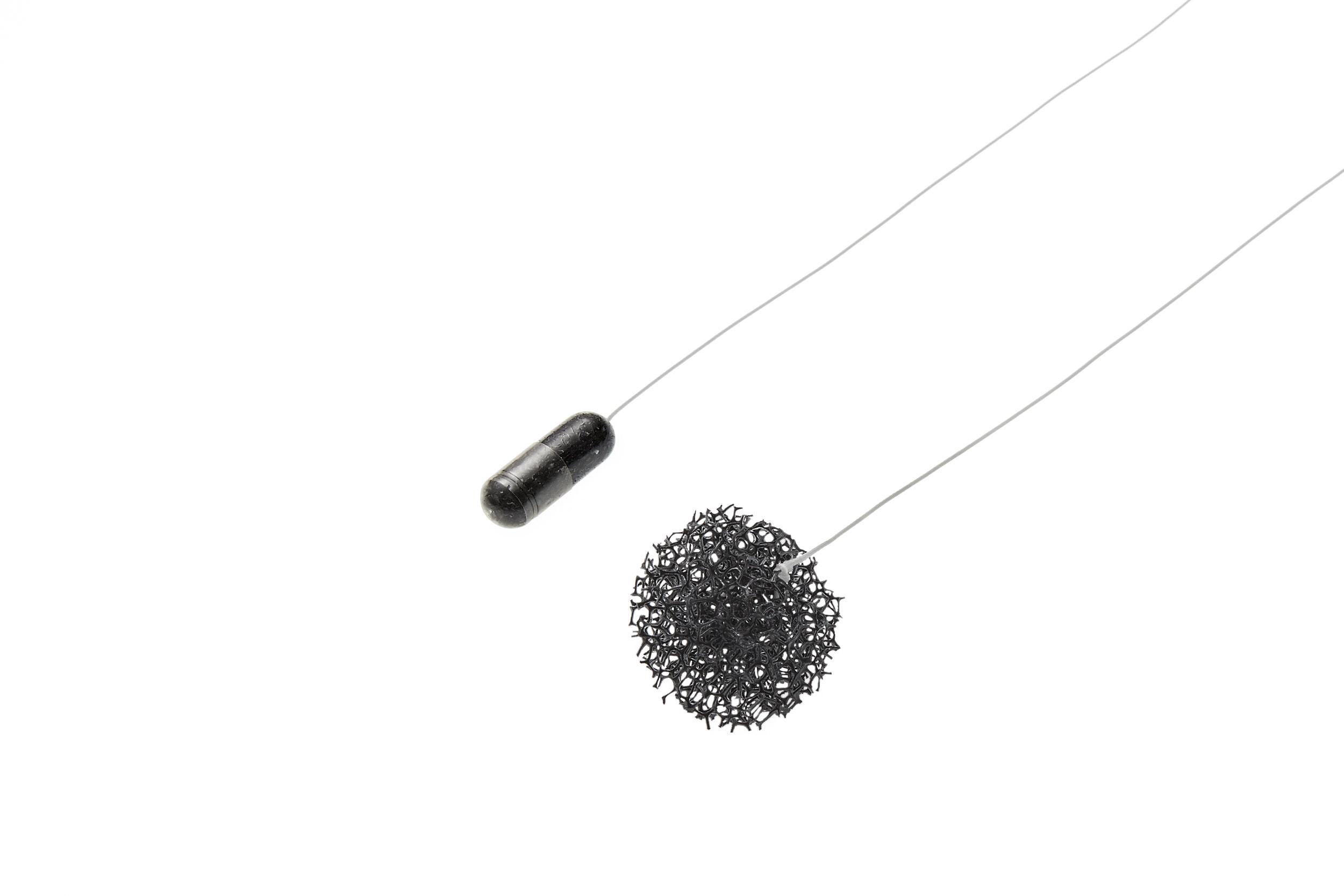
Submitted by Catherine Atkins on Thu, 28/11/2024 - 17:30
The first participants in a new landmark clinical trial for the “pill-on-a-thread” have completed their tests this week. The BEST4 Screening trial will be used to decide whether the capsule device should be used in a national screening programme for oesophageal cancer.
The capsule sponge, developed over more than ten years by Professor Rebecca Fitzgerald and a team of scientists, clinicians and nurses at the Early Cancer Institute, University of Cambridge and the Cancer Research UK Cambridge Centre, is faster, less invasive and far less expensive than endoscopy, which is currently used to diagnose Barrett’s oesophagus and oesophageal cancer.
The test, which takes just ten minutes, has been piloted in health services in England, Scotland and Northern Ireland for patients who are currently on waiting lists for endoscopy, because they have long-term heartburn or have already been diagnosed with Barrett’s oesophagus. To date, over 24,000 capsule sponge tests have been performed in pilot programmes, helping to reduce diagnostic backlogs in endoscopy and NHS pathology.
The BEST4 Screening trial will find out if the capsule sponge test could be used to screen people with heartburn for Barrett’s oesophagus – a condition that can lead to oesophageal cancer.
The trial is backed by £6.4 million of funding from Cancer Research UK and the National Institute for Health and Care Research (NIHR). It will be led from Cambridge University Hospitals NHS Foundation Trust (CUH) and the University of Cambridge, with the Cancer Research UK Cancer Prevention Trials Unit at Queen Mary University of London designing the trial and analysing results from it.
The trial will find out if the capsule sponge test can reduce the need for cancer treatments and prevent deaths from oesophageal cancer. The trial showcases UK science and innovation and is the last step in a series of clinical trials to see if the capsule sponge test could be offered in the cancer screening programmes of the 4 UK nations.
Over the next three years, the trial will recruit 120,000 people who regularly take medication for heartburn – the most common symptom for Barrett’s oesophagus. Barrett’s oesophagus is a precursor condition to oesophageal cancer, where cells in the food pipe start to grow abnormally. Invitations to join the trial will be sent by text message from NHSresearch to encourage as many eligible people as possible to take part in England. Participants will be asked to join Heartburn Health, a new platform to take part in clinical trials in heartburn-linked cancers like BEST4 Screening. Mobile screening vans will be rolled out across England to deliver the tests as part of the trial.
There are around 9,300 new cases of oesophageal cancer in the UK every year, according to analysis from Cancer Research UK. Oesophageal cancer is the seventh most common cause of cancer death in the UK, with around 22 deaths a day from the disease.
The capsule sponge starts off as a small, coated pill attached to a thread. When a patient swallows the pill and it reaches the stomach, the coating dissolves and the sponge inside it expands to the size of a 50p coin. The sponge collects cells from the oesophagus as it is gently pulled out from the stomach by a nurse or GP. The cells are sent for testing for two proteins called Trefoil Factor 3 (TFF3), which is only found in Barrett’s oesophagus, and altered p53 protein, which identifies cells which are starting to grow out of control and become oesophageal cancer.
Cancer Research UK has funded several successful clinical trials to demonstrate that the test is safe and accurate, which have been designed and run by the Cancer Research UK Cancer Prevention Trials Unit at Queen Mary University of London. A previous clinical trial, BEST3, showed that the capsule sponge test picks up 10 times more cases of Barrett’s oesophagus in people with chronic heartburn, compared to routine GP care.
Paul Anderson (59), a stock controller from St Neots, is one of the first participants to join the BEST4 Screening trial in Cambridgeshire.
Paul said:
“I first experienced acid reflux 10 years ago and I was referred for endoscopy to get it checked out. I’ve been on medication for heartburn ever since to manage it. I’d never been on a clinical trial before, but when the invitation came for this one, I felt I had to sign up as the acid reflux had flared back up again. I’m hoping that it may give me some more insight into my chronic heartburn, as well as helping people who may have similar concerns about their health.
“I’m hopeful that playing my small part in this worthy cause will help others to get checked out earlier.”
Director of the Early Cancer Institute at the University of Cambridge, inventor of the capsule sponge test and co-principal investigator of the BEST4 trials, Professor Rebecca Fitzgerald, said:
“The capsule sponge is changing how we detect Barrett’s oesophagus and oesophageal cancer. Catching it earlier can save lives by reducing the need for chemotherapy and surgery to remove the oesophagus.
“The BEST4 Screening trial is the pinnacle of many years of painstaking research, which has demonstrated that the capsule sponge can reliably identify Barrett’s oesophagus. Thousands of people have already benefited in trials and pilot programmes, and now we’re taking the test to the next level to see if we could offer this to everyone with heartburn.
“The BEST4 Screening trial could fundamentally transform the lives of people affected by oesophageal cancer by providing the crucial evidence needed to make it a viable screening programme, rolled out to every part of the UK.”
The BEST4 Screening trial is open to men over the age of 55 and women over the age of 65 who are currently taking medication for chronic heartburn. The Endosign test used in the trial is manufactured by Cyted Health, who also carry out the pathology tests on samples obtained by the capsule sponge.
More information about how to join the trial can be found at https://best4trial.secureserversites.net/ or by emailing cuh.best4.trial@nhs.net. You can also sign up to the NIHR’s Be Part of Research service at bepartofresearch.uk to take part in clinical research. Simply answer a few questions about yourself and the conditions you’re interested in to be matched to studies happening in locations near you.
Film explaining the capsule sponge test.


